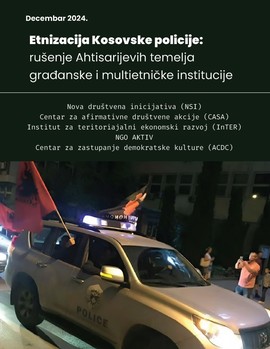Active projects
Active researches
Active evaluations
Ethnization of Kosovo Police: Erosion of Ahtisaari’s Basis of a Civic and Multiethnic Institution
Date start: 13.12.2024.
 In the last three years in Kosovo, a trend has been observed on social networks, especially on TikTok, where members of the Kosovo Police promote Albanian ethnonationalism, contrary to the Constitution and legislation in force.
By analyzing the legislation, it has been established that such behavior on social networks violates at least 13 articles of the secondary act on discipline, as well as the Constitution of Kosovo and the laws governing Kosovo's institutions as civic and multiethnic.
By analyzing TikTok content from early November 2024, which included a cumulative search of hashtags related to the Kosovo Police, it was found that there are over 14,000 posts related to it. For example, just the hashtag #njesiaspecialekosoves (special unit of Kosovo) has over 4,000 posts that generated over 270 million views.
The ethnonationalist musical background used in posts containing most of the problematic content, which is measured in thousands, characterizes the security apparatus as an enforcer of Albanian nationalist goals, rather than as an enforcer of Ahtisaari's vision of Kosovo.
As evidence of this illegal and nationalist practice that undermines the multiethnic and civic character of the security apparatus, the authors provided over 140 photographs showing more than 300 police officers using illegal emblems and symbols, flags, or gestures that clearly identify their ethnic affiliation and emphasize their nationalist political views or glorify the concept of extrajudicial “justice.”
Although the trend pointed out here is widespread in Kosovo, public recognition of the harmfulness of this practice, condemnation, and sanctions for such behavior are lacking. The institutions most responsible for preventing such phenomena, the Kosovo Police Inspectorate, and international missions with monitoring status, such as the European Union Rule of Law Mission – EULEX, have not reacted in the last three years since the expansion of this trend.
The report is jointly developed by five organisations: New Social Initiative (NSI), Center for Affirmative Social Actions (CASA), Institute for Territorial Economic Development (InTER), NGO Aktiv and the Advocacy Center for Democratic Culture (ACDC).
In the last three years in Kosovo, a trend has been observed on social networks, especially on TikTok, where members of the Kosovo Police promote Albanian ethnonationalism, contrary to the Constitution and legislation in force.
By analyzing the legislation, it has been established that such behavior on social networks violates at least 13 articles of the secondary act on discipline, as well as the Constitution of Kosovo and the laws governing Kosovo's institutions as civic and multiethnic.
By analyzing TikTok content from early November 2024, which included a cumulative search of hashtags related to the Kosovo Police, it was found that there are over 14,000 posts related to it. For example, just the hashtag #njesiaspecialekosoves (special unit of Kosovo) has over 4,000 posts that generated over 270 million views.
The ethnonationalist musical background used in posts containing most of the problematic content, which is measured in thousands, characterizes the security apparatus as an enforcer of Albanian nationalist goals, rather than as an enforcer of Ahtisaari's vision of Kosovo.
As evidence of this illegal and nationalist practice that undermines the multiethnic and civic character of the security apparatus, the authors provided over 140 photographs showing more than 300 police officers using illegal emblems and symbols, flags, or gestures that clearly identify their ethnic affiliation and emphasize their nationalist political views or glorify the concept of extrajudicial “justice.”
Although the trend pointed out here is widespread in Kosovo, public recognition of the harmfulness of this practice, condemnation, and sanctions for such behavior are lacking. The institutions most responsible for preventing such phenomena, the Kosovo Police Inspectorate, and international missions with monitoring status, such as the European Union Rule of Law Mission – EULEX, have not reacted in the last three years since the expansion of this trend.
The report is jointly developed by five organisations: New Social Initiative (NSI), Center for Affirmative Social Actions (CASA), Institute for Territorial Economic Development (InTER), NGO Aktiv and the Advocacy Center for Democratic Culture (ACDC).Publications
Resource center
- 08.07.2016.InTER Newsletter 16 Eng
- 20.05.2016.InTER Newsletter 16










